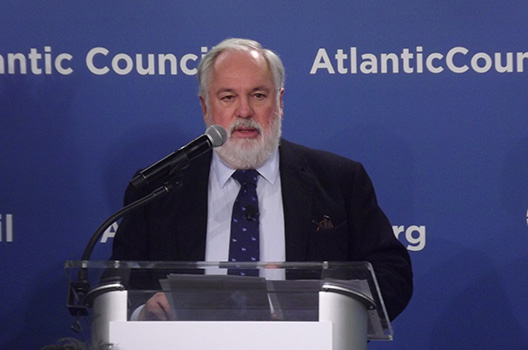 The issue of energy security has become one of the most important issues facing Europe today. The recent Russian aggression against Ukraine has once again stressed the importance of cooperation within the European Union (EU), as well as transatlantic ties with the United States. The importance of energy security is understood and stressed by the Atlantic Council, and the Global Energy Center aims to address issues surrounding the structural challenges of developing secure European energy systems, as well as strengthen transatlantic cooperation on energy issues in the future.
The issue of energy security has become one of the most important issues facing Europe today. The recent Russian aggression against Ukraine has once again stressed the importance of cooperation within the European Union (EU), as well as transatlantic ties with the United States. The importance of energy security is understood and stressed by the Atlantic Council, and the Global Energy Center aims to address issues surrounding the structural challenges of developing secure European energy systems, as well as strengthen transatlantic cooperation on energy issues in the future.
Mr. Miguel Arias Cañete, European Commissioner for Climate Action and Energy, addressed what challenges the EU faces today, what is planned to solve these challenges in the future, and what can be done within US-EU cooperation. One of the principle challenges that Europe faces is rooted in the events following the annexation of Crimea in the March of last year. With over a third of gas imported by the EU coming from Russia, Commissioner Cañete stressed the importance of unity, and noted that “when it comes to energy, do not put your faith in autocratic regimes.” To address these challenges, a new European Energy Security Strategy was developed and the European Energy Union was created. The five fundamental dimensions of the Union are grounded in the diversification of energy sources, a competitive, internal EU energy market, reducing energy demand and promoting efficiency, the decarburization of the EU energy mix, and focusing on the research and innovation of safer, cleaner energy. With the danger of falling victim to energy being used as a political tool, the EU will put the construction of the “South Corridor,” a trans-Adriatic pipeline, which will allow the import of natural gas from Azerbaijan, a very high priority. Additionally, developing a comprehensive gas transport infrastructure within Southeastern and broader Europe will contribute greatly to energy security. EU has plans on developing LNG hubs and transport infrastructure, bolstering domestic European supply and reducing the reliance on outside imports. Reducing energy consumption and innovating cleaner, safer, and more efficient energy sources, grids and consumption patterns is crucial in achieving this objective. Finally, the importance of transatlantic cooperation between the EU and US is key in the future. With the rapidly changing and evolving global energy map, the upcoming Paris Summit can be a pivotal moment in developing an agreement on future commitments and perhaps a legally binding framework for energy cooperation. The importance to the firm commitment to laws and regulation is demonstrated by the failure of Russia to establish its planned “Southern Stream” gas pipeline on its own terms.
The Commissioner stressed the importance of unity and cooperation within Europe. Only by tight cooperation within the EU, a serious commitment to diversification of sources, energy efficiency, and transatlantic cooperation can guarantee the development of secure energy in Europe, and with time, around the globe. Commissioner Cañete emphasized that he is optimistic about the future, and believes that with times of great crises, comes great opportunities as well.
European Energy Security Challenges and Transatlantic Cooperation in 2015 event with Miguel Arias Cañete was hosted by the Global Energy Center on February 4, 2015.
